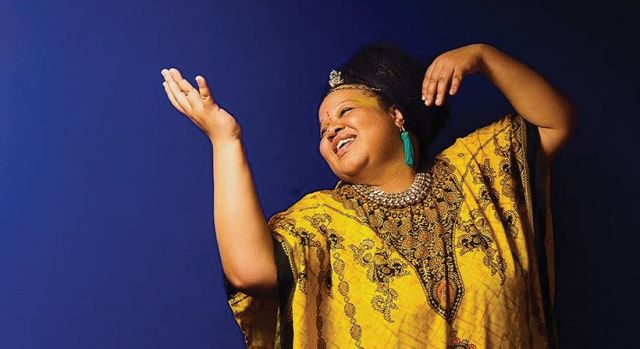Home > Jazz / Blues
02/28/2022
Angel Bat Dawid & Brown Calculus at PDX Jazz Festival at Alberta Abbey 2/26/22 : Dawid stirs things up
By MICHAEL SHOEHORN CONLEY // Brown Calculus and Angel Bat Dawid respond to societal trauma at their PDX Jazz Festival 2022 appearance.
Part 2) Angel Bat Dawid & Brown Calculus at Alberta Abbey:
The following evening I went to see performance artist Angel Bat Dawid, with the local duo Brown Calculus opening the show. When I arrived at the Alberta Abbey I saw a table full of electronics, a video projector and a screen flanking a red keyboard and instrument stands holding B-flat, E-flat, and bass clarinets.
Nicholas Salas Harris, artistic director of the festival, gave a brief introduction explaining that the space is no longer a consecrated place of worship– it is a community venue that his festival wishes to support.
The venue actually reminded me of places I’ve been in Europe where religious buildings have been converted to use for artistic presentations and festivals. It has a really lovely ambience, and they've opened up one wall so that people in the bar area can also watch the concerts.
Local act Brown Calculus (vocalist Vaughn Kimmons and producer Andre Burgos) has been gaining popularity in recent years, but this is the first time I've heard them. Kimmons has a lovely alto voice and charismatic stage presence. Their approach to the music is somewhat different in that the electronic backgrounds created by Burgos didn't consist of the drum machine and heavy bass typical of a lot of electronica. This soundscape was more atmospheric, and some of the percussive effects were actually hisses and blips rather than boom-bap drum machine samples.
Some of the little mantras that were repeated during this performance included “Spirits need rest” and “they saw what was coming so they jumped”, referring to their ancestors, plus “Human connection is important” and “Love’s always expanding”. Kimmons also sang “Gone are the days of self-sabotage” and referred to the stress of being “a stolen person on stolen land”.
There was lots of philosophical, uplifting stuff here, supported by beats born of distortion and processing. Kimmons said she was happy to perform for an audience again, and elicited a cheer by singing “I'm so tired of zooming everybody” and exhorting us to share, singing “bowls of gold on the table– pass it down to your neighbor”. All of this generated a sympathetic atmosphere, and I was left thinking that I love her voice, and I love her message.
Following an intermission, a compelling video montage/slideshow began on stage, depicting historic images of Black people, also photos of archeological relics, such as an image of a terra cotta fertility icon manipulated with animation. One particularly intriguing sequence was of a figure in silhouette poling a pirogue down a river.
Angel Bat Dawid began her performance in acapella voice, singing “I will never die, for I be indestructible consciousness”, repeating this phrase as she proceeded through the auditorium before taking the stage to accompany herself on the keyboard.
Her performance was very autobiographical, including information about her family, and how the Funkadelic record “Maggot Brain” changed her life. Reaching over and hitting a laptop to launch a pre-recorded background, she picked up the Bb clarinet for a brief bit of soloing.
Dawid deftly conducted the crowd in a singalong, dividing us into the “Oh”s and the “Yeah”s, at one point thrashing around on the floor, kicking her legs. This was some classic showmanship!
Dawid told us that she experiences racism “about 10 times a day”, and is scarred by the mainstream ideals of female beauty and worth, both of which are familiar concerns to anyone who actually listens to women of color.
She name-checked the iconic bandleader/visionary Sun Ra before playing a solo on her bass clarinet, going a bit outside the lines with an aggressive attack before returning to the more consonant sounds of her keyboard.
Her voice cracking, she sang “America you still don't care, he had a dream, living in a nightmare”. There was raw truth and emotion here, and continuity with the message of the opening act.
Some of her pronouncements came off a bit preachy, even sanctimonious. But there is no understanding to be gained by minimizing the trauma of another person, and the audience seemed to be with her up to this point, willingly responding to her performance-art skill set.
Dawid referred to the Black church and sanctified music, and insisted that the converted Abbey was a consecrated space, as if it was still inhabited by the spirits of those who participated in sacred rites there.
She then introduced the concept of repenting, and invited the audience to come forward to “repent” like they do in “the Black church”– to repent for the history of racism. No one approached the stage. She repeated her request several times, finally, seeming a little irritated, asked “how come none of you are up here?” adding that every single one of us should be on stage.
Unwisely, one person stated that he was “not going to do that in your (her) religious context”. To this Dawid erupted in fury and profanity, demanding the man leave, calling on security to eject him, and using a string of expletives as modifiers to the word “racist”. She thundered “who said anything about religion?” (she did, albeit without citing specific doctrine) and “repent is not even about religion, it’s a military term”. (it is not)
Some people left during this outburst, including the man in question, yet still no one from the audience got up on stage with her, nor did anyone challenge her treatment of the man who had spoken. This incident was actually the most uncomfortable interaction I've ever seen between a performer and an audience.
The show wound down from this uncomfortable moment after Dawid’s rage eerily subsided, and she thanked us for our “validation”.
My feelings leaving the Abbey after Dawid’s show could not have been in deeper contrast to the feeling I got the previous night at the Christian Scott aTunde Adjuah concert. Chief Adjuah's show was presented with positivity, inclusiveness, consummate musicianship, and impeccable virtuosity. Dawid’s performance was less about the music, centering the trauma of her existence as a Black woman in an America that has not progressed nearly enough, a society that unfairly imposes superficial standards of attractiveness on its female population. There are many lessons to be learned here.








